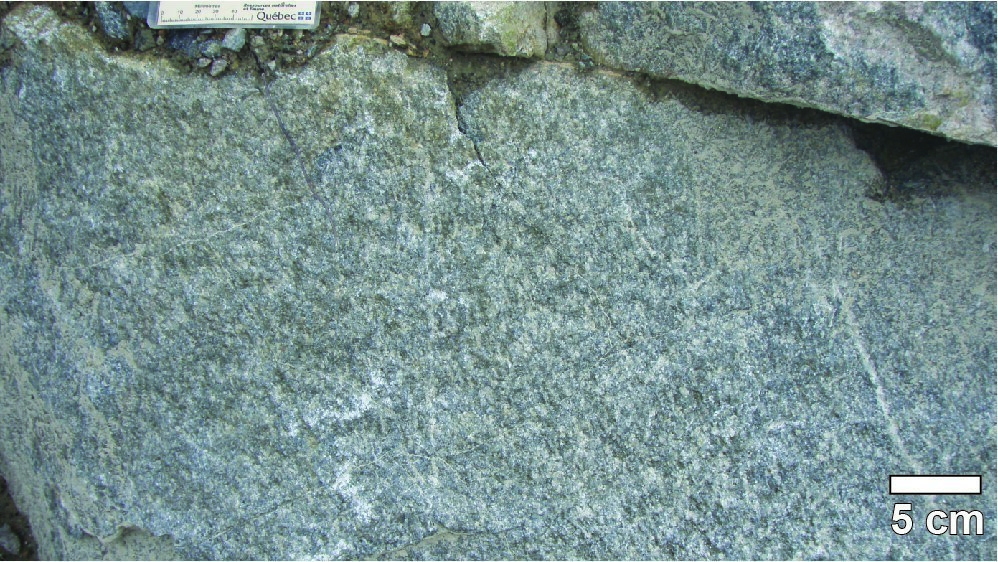
First published: 26 April 2019
Last modified: 24 January 2022
DISCLAIMER: This English version is translated from the original French. In case of any discrepancy, the French version shall prevail.
| Author(s): | Midra et al., 1992 |
| Age: | Neoarchean |
| Stratotype: | None |
| Type area: | The Anville Pluton outcrops well along forest roads east and south of Anville Lake (NE part of NTS sheet 32G11) |
| Geological province: | Superior Province |
| Geological subdivision: | Abitibi Subprovince |
| Lithology: | Tonalite, granodiorite |
| Category: | Lithodemic |
| Rank: | Lithodeme |
| Status: | Formal |
| Use: | Active |
- Lapparent Intrusive Suite
- Anville Pluton
- Houghton Pluton
- Est Tonalite
- Ouest Granodiorite
- Rachel Pluton
- MacIntosh Pluton
- Lapparent edge zone
- Lapparent tonalitic gneiss
- Lapparent gabbroic intrusion
Background
Intrusive rocks of the Anville Pluton were originally mapped by Remick (1956, 1957) and Lyall (1959). They are included in the Lapparent Intrusive Suite, first named by Racicot et al. (1984). The Anville Pluton is described in the report of Midra et al. (1992).
Description
Anville Pluton, Undivided (nAanv): Tonalite and Tonalite Containing Basalt and Gabbro Enclaves
According to Midra et al. (1992, p. 29): “The pluton consists generally of medium-grained grey tonalite, except in the western part, where its composition gradually changes to light pink porphyritic granodiorite.”
Tonalite is subhedral and displays a cataclastic to mylonitic texture in the southern part of the pluton.
According to the same author: “The main minerals encountered are: plagioclase, quartz, biotite, hornblende and microcline. Accessory minerals are epidote, allanite, sphene, chlorite, apatite, muscovite and opaque minerals. Plagioclase (An25-28) forms euhedral to subhedral millimetric crystals. It is locally zoned and, in some cases, has myrmeckitic edges. The core of plagioclase is commonly altered to epidote and sericite. Quartz (0.05-1.5 mm) is interstitial to plagioclase and has undulatory extinction. In a few thin sections, grains have sutured edges. Tabular biotite (0.1-3.5 mm) highlights foliation of the rock. It is locally altered to chlorite or muscovite, and is commonly associated with sphene and epidote. Subhedral hornblende (0.1-3 mm) is restricted to a few samples. It is commonly surrounded by biotite. Microcline is in a minor phase in tonalite […].”
Anville Pluton 1 (nAanv1): Granodiorite
Granodiorite is composed of quartz (25%), albite or oligoclase (40-45%), K-feldspar (10-15%), green hornblende (10%), white mica (3-4%), epidote (4-5%) and accessory minerals such as ilmenite, apatite and zircon (Picard, 1985).
According to Midra et al. (1992, p. 29): “Foliation in granodiorite is marked by quartz stretching, the alignment of microcline phenocrystals and micaceous minerals. This foliation is locally accompanied by a slight subhorizontal mineralogical lineation. In places, quartz grains display crenulation at the outcrop scale.”
Thickness and distribution
The pluton has an ovoid shape with a long axis ~28.5 km parallel to regional foliation WNW-ESE. The short axis, oriented NNE-SSW, has a maximum length of 9.2 km.
Dating
A sample taken on outcrop 2012-YD-2676 yielded a crystallization age of 2714.8 ±0.6 Ma (Augland et al., 2016).
| Unit | Sample Number | Isotopic System | Mineral | Crystallization Age (Ma) | (+) | (-) | Inherited Age (Ma) | (+) | (-) | Reference(s) |
| nAanv | 2012-YD-2676A | U-Pb | Zircon | 2714.8 | 0.6 | 0.6 | 2720 | 3 | 3 | Augland et al., 2016 |
Stratigraphic Relationship(s)
The Anville Pluton cuts mafic volcanic rocks of the Chrissie and Obatogamau formations, intrusive rocks of the Lapparent Intrusive Suite (Houghton Pluton, gneissic units, Est Tonalite), and the Fardoche Stock.
Paleontology
Does not apply.
References
Publications available through SIGÉOM Examine
AUGLAND, L.E., DAVID, J., PILOTE, P., LECLERC, F., GOUTIER, J., HAMMOUCHE, H., LAFRANCE, I., TALLA TAKAM, F., DESCHENES, P.-L., GUEMACHE, M.A., 2016. Datations U-Pb dans les provinces de Churchill et du Supérieur effectuées au GEOTOP en 2012-2013. MERN, GEOTOP; RP 2015-01RP 2015-01, 43 pages.
LYALL, H. B., 1959. Région de Brongniart – Lescure, district électoral d’Abitibi-Est. MRN; RG 085, 45 pages, 1 plan.
MIDRA, R., CHOWN, E. H., TAIT, L., 1992. Géologie de la région du lac Dickson (bande Caopatina-Desmaraisville). MRN; MB 91-30, 65 pages.
PICARD, C., 1985. Géologie de la région du lac Inconnu, Abitibi-Est, Québec. MRN; ET 83-16, 55 pages, 2 plans.
REMICK, J. H., 1956. Rapport préliminaire sur la région d’Anville – Drouet, comté d’Abitibi-Est. MRN; RP 322, 11 pages, 1 plan.
REMICK, J. H., 1957. Rapport préliminaire sur la région de Guercheville – Lapparent, district électoral d’Abitibi-Est. MRN; RP 343, 15 pages, 1 plan.
Other publications
GERVAIS, D. 1986. Le caractère de la zone de contact entre l’intrusion tonalitique syn- à postcinématique d’Anville et le terrain de gneiss du Massif de Lapparent. Université du Québec à Chicoutimi; Bachelor’s thesis, 56 pages.
RACICOT, D., CHOWN, E.H., HANEL, T., 1984. Plutons of the Chibougamau-Desmaraisville belt; a preliminary survey. In: Chibougamau: stratigraphy and mineralization (Guha, J. and Chown, E.H., editors). Canadian Institute of Mining and Metallurgy; volume 34, pages 178-197.
Suggested Citation
Ministère de l’Énergie et des Ressources naturelles (MERN). Anville Pluton. Quebec Stratigraphic Lexicon. http://gq.mines.gouv.qc.ca/lexique-stratigraphique/province-du-superieur/pluton-anville_en [accessed on Day Month Year].
Contributors
|
First publication |
Patrice Roy, P. Geo., M.Sc. patrice.roy@mern.gouv.qc.ca (redaction) Mehdi A. Guemache, P. Geo., Ph.D. (coordination); François Leclerc, P. Geo., Ph.D. (critical review); Mélina Langevin, B.Sc. and Simon Auclair, P. Geo., M.Sc. (editing); Céline Dupuis, P. Geo., Ph.D. (English version); Ricardo Escobar Moran (HTML editing). |


